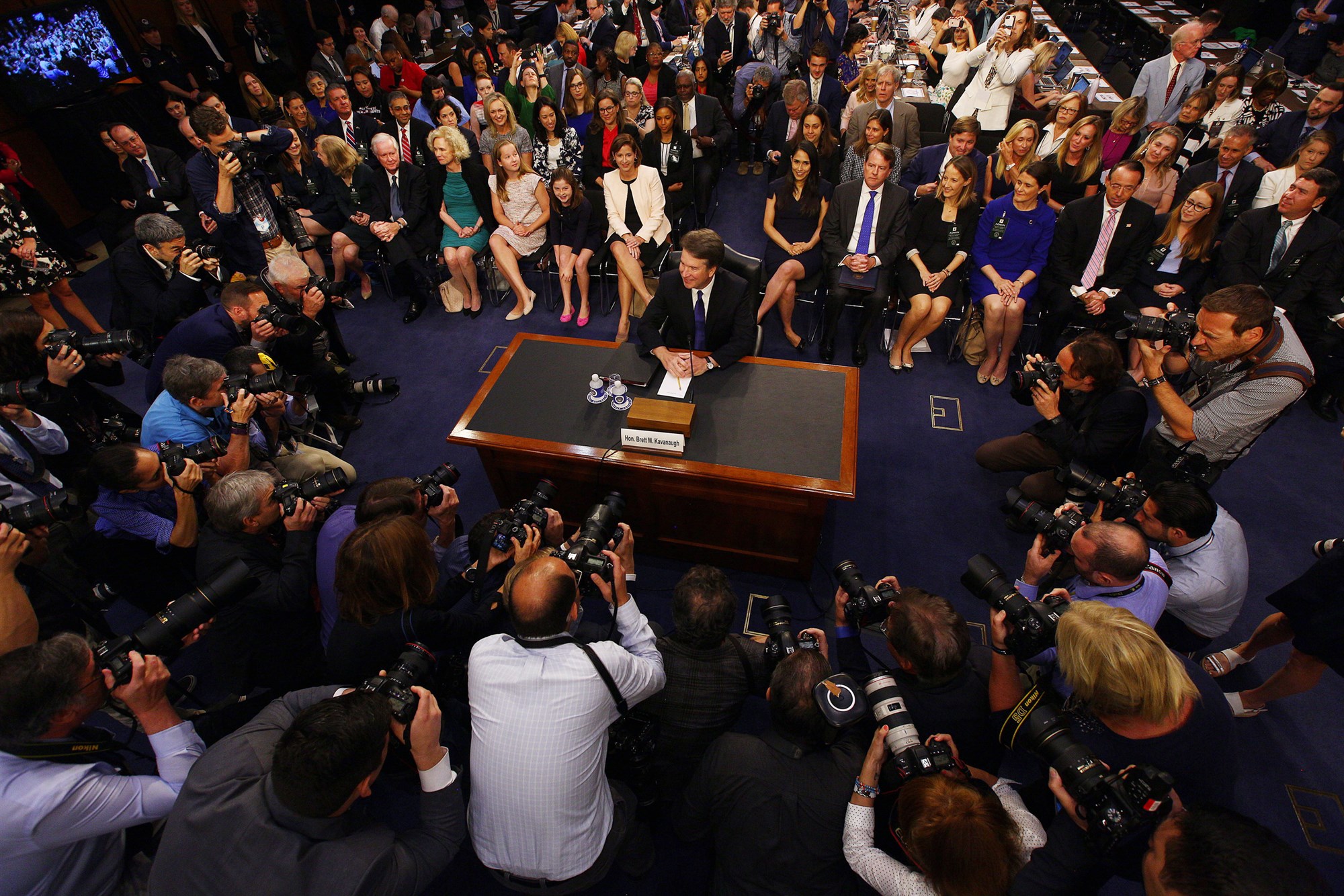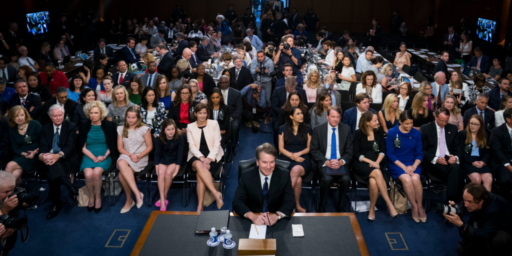The Kavanaugh Nomination Heads Toward Its Inevitable Outcome
The nomination of Judge Brett Kavanaugh is, effectively, assured. Democrats should be careful about how much further they push their opposition.

With the Brett Kavanaugh confirmation hearings over and the Senate Judiciary Committee is likely to vote on sending his nomination to the Senate floor as early as the end of this week, meaning that we’re likely to see a floor vote as early as the end of next week that would allow Kavanaugh to take the bench in his new court well in advance of the first day of the Court’s upcoming term. In the wake of those hearings, Robert Barnes and Seung Min Kim note that the hearings did little to alter the ultimate expected outcome of the nomination fight:
Supreme Court nominee Brett M. Kavanaugh walked a familiar tightrope last week at his confirmation hearing: professing an open mind to the liberal senators who will surely oppose him anyway, but giving no reason for the Republican majority to doubt he will be a stalwart on a more consistently conservative high court.
Senate Majority Leader Mitch McConnell (R-Ky.), on a path to make a transformation of the Supreme Court and federal judiciary the legacy of his tenure, flatly declared that the 53-year-old Kavanaugh would be in place when the justices begin their new term Oct. 1.
“Judge Kavanaugh’s judicial temperament and brilliance were on full display during this week’s hearings,” McConnell tweeted Friday. “He will make an excellent Supreme Court Justice.”
Democrats, who say the fight’s not over, aggressively questioned Kavanaugh’s honesty, reviving disputes over what they claim were misleading statements made when the former George W. Bush White House lawyer was confirmed to the U.S. Court of Appeals for the D.C. Circuit in 2006.
They criticized the Republican push to elevate Kavanaugh without a full rendering of his White House records. They claimed his nomination — more important than most because he would be replacing the pivotal member of the Supreme Court, Justice Anthony M. Kennedy — imperiled long-held precedents on abortion, gun control and curbs on presidential power.
But by the close of the four-day hearings, some Democrats on the Senate Judiciary Committee seemed resigned to Kavanaugh’s confirmation.
“I pray that I misjudged him and in fact he will, as a justice if confirmed, follow precedent more closely,” said Sen. Christopher A. Coons (D-Del.). “But obviously I’m gravely concerned about that, based on his long and established record.”
Those sorts of concerns are hardly unique to Kavanaugh.
Nominees of presidents from both parties, selected for their ideology as much as their legal brilliance, move toward the center for their first — and usually last — extended moment on the national stage.
In his buoyant but cautious star turn, Kavanaugh was no different. He picked his way through Supreme Court precedents, endorsing those he figured favorable to his chances and refusing to say whether a multitude of others were rightly or wrongly decided.
He avoided any criticism of the man who chose him, President Trump. He demurred even when asked if he agreed with Trump that there was wrong committed by both sides at the white-nationalist rally in Charlottesville.
He heeded his own advice, given as a young White House lawyer for a nominee facing confirmation for a lower court:
“She should not talk about her views on specific policy or legal issues,” he wrote in a 2003 memo that was released after Democratic senators protested it was being withheld by committee Republicans.
“She should say that she has a commitment to follow Supreme Court precedent, that she understands and appreciates the role of a circuit judge, that she will adhere to statutory text, that she has no ideological agenda.
As I’ve already noted, the outcome of Kavanaugh’s nomination fight seems fairly easy to predict. With a slim but apparently solid majority and the filibuster no longer an issue, Republicans are likely to stay united in voting to confirm Kavanaugh, which alone will be enough. The two most likely Republican defectors, Susan Collins of Maine and Lisa Murkowski of Alaska, have made it clear in the past that they would be reluctant to vote for a nominee who would be likely to vote to overrule Roe v. Wade. In response to questions about that case, Kavanaugh said repeatedly that he considered Roe and Planned Parenthood v. Casey, a 1992 case in which the Court largely reaffirmed the central holding in Roe, were “settled law” although he, properly declined to say how he might right in a hypothetical case challenging Roe and Casey directly. This is likely to be sufficient for both Collins and Murkowski to vote in favor of Kavanaugh on the floor. Additionally, Kentucky Senator Rand Paul had previously expressed some reservations regarding Kavanaugh’s views on Executive Branch power but ended up backing his nomination after meeting with him at the end of July. Finally, the Republican caucus is back at full strength with the appointment of Jon Kyl to fill the seat of the late John McCain. Prior to being appointed to McCain’s seat, Kyl was guiding Kavanaugh’s nomination through the Senate, so it seems obvious that he will be voting for Kavanaugh on the floor. This means that, even without any Democratic defections, Republicans will be able to confirm Kavanaugh easily.
On the Democratic side, the vast majority of the Democratic caucus is, of course going to vote against Kavanaugh’s confirmation. However, as I ‘ve noted before, there are a handful of Senators who are likely to be tempted to vote in favor of it due to the fact that they are running for re-election in very pro-Trump, pro-Republican states. These include Senators such as Joe Manchin, Joe Donnelly, Heidi Heitkamp, and Doug Jones, and writing today in The New York Times, Michael Tomasky advises Democrats not to push these Senators too far:
Next, activists’ attentions will turn to the Democrats who might end up voting to confirm Mr. Kavanaugh. These include most notably a handful of incumbents who are up for re-election in states Donald Trump carried: Joe Donnelly in Indiana, Heidi Heitkamp in North Dakota, Joe Manchin in West Virginia, Claire McCaskill in Missouri, Jon Tester in Montana and possibly Bill Nelson in Florida.
There are other red-state Democratic senators seeking re-election this fall — Sherrod Brown in Ohio and Debbie Stabenow in Michigan, for example. But for reasons peculiar to them, their races and their states, they’re generally considered to be able to cast safe “no” votes.
So liberal activists and groups are presumably going to spend time and precious money this month lobbying the above senators to vote no. I say to them: Don’t do it. It’s a waste of said time and money, for two reasons.
First of all, if Ms. Murkowski and Ms. Collins vote “aye,” Mr. Kavanaugh has his 51 votes. It’s over. It doesn’t matter at that point if he has 51 votes or 56.
You have to look at the situations these people find themselves in, consider their re-election prospects — and consider the alternative. Take Mr. Manchin, whose circumstance is the one I know best.
He’s running for re-election in a state, my home state, where Mr. Trump is still enormously popular. Yet, Mr. Manchin is around eight points ahead of his Republican opponent, Patrick Morrisey, the state attorney general. Right now, Mr. Morrisey hasn’t yet quite found a theme on which to hammer Mr. Manchin.
But if Mr. Manchin were to cast a (numerically meaningless!) vote against Mr. Kavanaugh — presto. The rest of the race would be about that, and nothing but that. Millions of dark money dollars would pour in for TV ads blasting Mr. Manchin for going against the wishes of their president.
So what, you say? Good riddance to a conservative Democrat? You’d better go read up on Mr. Morrisey. He’s one of 18 attorneys general who have signed on to a lawsuit to gut the Affordable Care Act and eliminate coverage for people with pre-existing conditions. Mr. Manchin, and all the red-state Democrats mentioned above, have defended Obamacare stoutly.
But here’s the second and more important reason to give the red-state Democrats a pass here. This battle wasn’t lost last week, and it sure won’t be lost by these red-state Democrats if they vote to confirm. It was lost in 2016.
It was lost by the Democratic Party, the Hillary Clinton campaign, and the courts-oriented grass roots and public-interest groups that didn’t do nearly enough to explain to the Democratic rank and file in 2016 that a Clinton victory would mean a liberal court majority for the first time in 30 years.
I kept waiting and waiting that fall for Ms. Clinton to emphasize this point, or for other prominent figures to say, “Look. You’re not wild about Hillary Clinton? Fine. Are you wild about Roe v. Wade, same-sex marriage, protections for immigrant children, campaign finance contribution limits? Then you’d damn well better vote.”
It never happened. So that’s on them. But honestly, regular voters should have been mature enough to have figured this out on their own. They’re to blame, too.
Tomasky is largely correct, of course. If the Republicans stay united, which seems likely, then the die cast and Kavanaugh will be confirmed. The question at that point for Democrats will be quite simple. Do they want to pressure candidates such as Manchin, Donnelly, and Heitkamp to toe the party line, thus taking the risk that they could lose their fights for re-election in November and thus scuttle any chance the Democrats have of taking control of the Senate in November? Or, do they want to do what they can to save these seats in the hope that they will pick up seats in states like Arizona, Tennessee, and Nevada and thus take narrow control of the Senate? Democrats can’t have it both ways so they would be advised to choose wisely.






In other words, the Dems should roll over? Again? Bullshit.
The man is clearly guilty of perjury.
If appointed, and the Dems take the house…they should immediately move to impeachment on those grounds.
@Daryl and his brother Darryl:
Are you suggesting that Democrats force red-staters like Manchin et al put their seat on the line for what in the end would be a meaningless “no” vote?
As for the perjury claim, Vox consulted four legal experts and they all disagree with the assertion that Kavanaugh perjured himself.
Even if Democrats do take the House, there will be no impeachment vote.
@Doug Mataconis:
Manchin is going to vote yes, as are renowned hypocrites Collins and Murkowski.
I’m suggesting that Democrats grow some balls and start fighting in a manner commensurate with the stakes. This guy was dishonest and evasive…if it doesn’t reach the high bar of perjury…who gives a fvck?
We are talking about the rights of women and minorities being abridged for the next 50 years. I’d call that a hill worth dying on.
Murkowski and Collins have apparently consulted their consciences (yeah, right) and made a calculation that the passage of time and claiming Kavanaugh lied to them will be sufficient cover.
Dems have a more complex calculation. There is marginal value in presenting a united front and preventing GOPs from being able to say the confirmation was bi-partisan. Dems need to be seen fighting this, but perhaps they’ve adequately covered that and a few defections won’t significantly blunt the effect. Voting no will have an effect on the Red state Dems, but with Trump’s fading popularity and Kavanaugh’s low polling, maybe less than generally assumed. Personally, I’d give the threatened Dems a pass, but the Party has better data than I do.
As Fed Chair, Alan Greenspan trusted big banks to regulate themselves, thereby becoming the biggest villain in the 2008 financial collapse. He was openly a devotee of Ayn Rand. That alone should have been disqualifying. With regard to the Supreme Court, being a protege of the Federalist Society should be disqualifying.
Remember, the issue in a few years will be was it Trump or was it Republicans. It was Republicans.
Why? Because the Republicans paid such a dramatic price for obstructing the Garland nomination? Yeah, Democrat’s much be shaking in their boots at the coming backlash.
Red State Democrats might have to take votes that are unpopular with the Democratic Bases in the coasts. But voting for Kavanaugh is not one of these votes. Like with Clarence Thomas there are far more downsides in voting for him that against him.
Like expanding the number of seats on SCOTUS once they have the presidency and Congress…
@Daryl and his brother Darryl:
No, he clearly either knew the documents were stolen, or should have know they there stolen. Only the first is perjury. There have been quite a few articles (from such right wing news sources as the Washington Post) explaining the difference. Basically guilty of “should have known” is equivalent to “make a mistake”. That’s not a standard I’d like to see enshrined in law as an automatic crime. Nor is ‘being wrong under oath’ something I’d like to see enshrined as perjury – I’ve been wrong too many times as an engineer and scientist (and I don’t feel bad about, every engineer and scientist is regularly wrong) to feel confident about my ability to be 100% right every time.
On the other hand, not hiring someone who’s made mistakes in the past is pretty reasonable. “Should have known” is a pretty good argument for not hiring someone, even if its not perjury. That’s the case the Democrats should be making – that he’s simply too incompetent to be a justice.
And I agree they should go down swinging; they’re going to lose just on pure math, but I don’t think there’s anything to lose in making the case, so long as they don’t overstate it (ie claiming perjury instead of incompetence).
@An Interested Party:
That could be entertaining, given the way the presidency switches between parties almost like clockwork every eight years (one exception since 1980). I think a supreme court with several hundred justices would be a lot of fun to watch.
@Daryl and his brother Darryl: Oooooookay!
@george:
Absolutely, win or lose, they have to be seen fighting. The GOP base re-elected the GOPs in Congress because they kept voting against the dreaded Obamacare, even though it was largely pointless (and even though a chunk of the base depend on Obamacare). But I don’t think the niceties of perjury v bad memory or incompetence will make a bit of difference a year from now, even two months from now. Kavanaugh is entitled to a presumption of innocence in a court case. This is a job interview. Beyond that, Dems should Bork him, Bork meaning to accurately describe his unpopular, out of touch, ideology.
(Besides holding extreme views and firing Archibald Cox, I only became aware some months ago that Bork’s book was instrumental in corrupting anti-trust enforcement.)
About as fun as watching a Republican-controlled Senate steal a Supreme Court seat away from a Democratic president…
@An Interested Party:
Sure. I’m just pointing out what the outcome will be, given the very regular 2-term alternating party in power pattern; if its done the next time the D’s are in power (I’m hoping in 2020 but history suggests 2024), its 100% guaranteed to be repeated in the other direction the next time the R’s are in power, and so on.
I’d prefer we just go to having elected justices (on popular vote with 12 year terms, four spots coming up for election every Presidential election). But if that’s impossible to get through, at least have limited terms on justices. The current system clearly isn’t working in America, where the whole process is extremely political … note that most countries have no such trouble. In Canada for instance most people can’t name even a single justice of the supreme court, because its been politically a non-issue – the justices don’t seem to rule on a political basis.
I’m still curious why in America it became so political. The political divides are as heated in say Canada as in America, and the range of political views as wide. But the Supreme court has never become politicized.